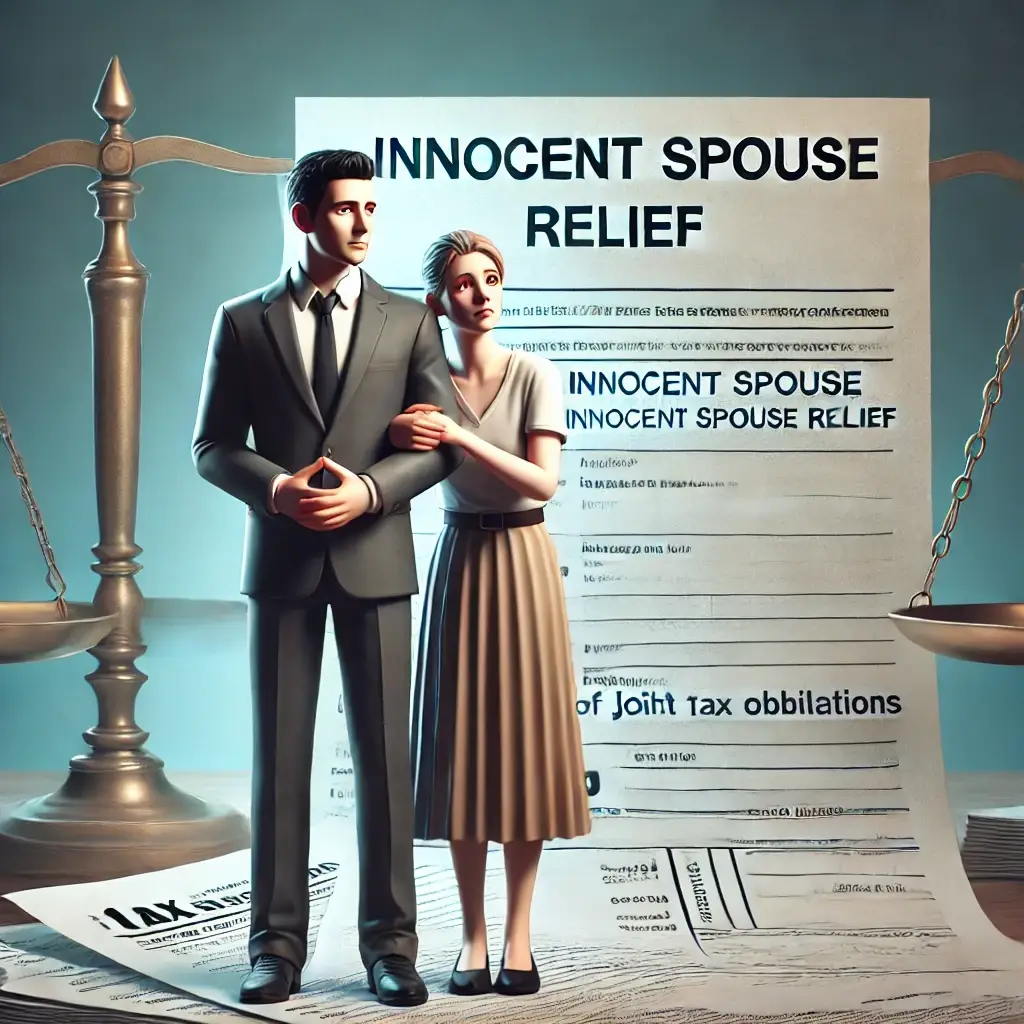
375 North Main Street Suite A-5
Williamstown NJ 08094
(856) 226-9524
mike@pinkharbor.com
Mon - Fri 9 AM - 5 PM
Night & Weekend Hours by Appointment

Williamstown NJ 08094
mike@pinkharbor.com
Night & Weekend Hours by Appointment
IRS Innocent Spouse Relief can relieve a spouse whom the IRS deems “innocent” from the fraudulent actions of their partner. In some situations, relief can be granted to the innocent spouse even if the innocent spouse knowingly signed a fraudulent return. Learn everything about Innocent Spouse Relief and IRS Form 8857, as well as where to file IRS Form 8857.

IRS Innocent Spouse Relief can relieve a spouse whom the IRS deems “innocent” from the fraudulent actions of their partner. Relief can possibly be granted to the innocent spouse even if the innocent spouse knowingly signed a fraudulent return.
IRS Innocent Spouse Relief would excuse a spouse from the tax liability on a joint return if their partner committed fraud on the return. Examples are intentionally claiming incorrect deductions, knowingly over-reporting or under-reporting income, or fraudulently claiming tax credits. Generally, the innocent spouse cannot have benefited from the income earned or the lower tax liability. There can be exceptions made for extreme circumstances such as spousal abuse.
If you’re facing a tax issue caused by your spouse’s or ex-spouse’s errors, IRS Innocent Spouse Relief is a provision to aid you in avoiding the joint tax liability. IRS Form 8857 could relieve you from responsibility for paying the tax liability, interest, and penalties for the tax year that relates to your spouse’s or ex-spouse’s tax troubles.
IRS Publication 971, Innocent Spouse Relief, outlines the four types of innocent spouse relief. They are:
To qualify for IRS Innocent Spouse Relief generally, three conditions must be met. Let’s review the qualifications for Innocent Spouse Relief with the IRS:
If, instead, you filed a tax return with the filing status of Married Filing Separately, you are automatically not liable for the tax debt of your spouse.
Notice that not knowing the tax return was wrong is the sole reasoning. The IRS will judge whether a reasonable person in a similar situation would have been aware of the issue. For example:
There are many reasons why holding the innocent spouse liable for the tax liability and resulting penalties and interest from their spouse would be unfair. Let’s examine what we consider to be the top 5 reasons:
IRS Form 8857, Request for Innocent Spouse Relief, is the form that allows the innocent spouse to request relief from a joint tax liability. This form ensures that the IRS can collect the essential information to consider your request for innocent spouse relief.
We recommend that you do not only submit IRS Form 8857 by itself. Don’t be fooled into thinking that you can only include explanations that fit into the explanatory lines provided. Instead, be as detailed and thorough in your explanation as possible. If you are attaching extra explanatory pages, indicate that extra supporting documents are attached. You should also attach as much supporting documentation as possible that supports your request. The IRS will always determine that third-party documents are the most independent and reliable substantiating documentation.
For example, if you were the victim of spousal abuse, letters from a medical provider or police reports would be more independent than letters from yourself or your friends.
For IRS Innocent Spouse Relief to work, you must follow all the steps that the IRS dictates. You must complete IRS Form 8857 completely. Attach supporting documentation to Form 8857.
All pages should have your social security number written in the upper right corner, and all pages should be hand-numbered. Hand numbering the pages will aid the IRS in properly assembling your documents if your documents get out of order when the IRS is reviewing them.
Send IRS Form 8857, along with all additional explanatory pages and supporting documents and evidence, to the following area:
Be sure to file either by certified mail or use a private delivery carrier (such as FedEx, UPS, or DHL) that will provide you with proof of delivery.
| VIA USPS | VIA PRIVATE DELIVERY SERVICE |
|---|---|
| Internal Revenue Service PO Box 120053 Covington, KY 41012 | Internal Revenue Service 7940 Kentucky Drive, Stop 840F Florence, KY 41042 |
The IRS fax number for Form 8857 is 855-233-8558.
If filing by fax, make sure to:
Looking at the statistical data the IRS provides can lead you to believe that it is hard to get innocent spouse relief from the IRS. In October 2023, the Treasury Inspector General for Tax Administration (TIGTA) issued the TIGTA Innocent Spouse Program Audit. The audit shows that the approval rate for IRS Innocent Spouse Relief is meager, ranging from 10% to 25%, depending on factors like the type of relief requested.
Do not let this discourage you because two of the top three reasons for rejections were utterly avoidable by the innocent spouse had they properly handled things. These two completely avoidable rejection reasons are Missing Deadlines and Lack of Documentation.
The TIGTA report also indicated that 22% of the rejected claims were improperly denied and should have been approved. Using a qualified tax resolution specialist like Pink Harbor, CPA could ensure that your claim does not fall into the common rejection reasons and that an appeal will be filed if your claim is improperly rejected.
IRS Form 8857 Instructions can be found on the IRS website. Simply click the link for a direct access to the IRS Form 8857 Instructions.
The IRS Form 8857 Instructions were last updated in June 2021.
The IRS Innocent Spouse Relief phone number is 1-855-851-2009. You can use the IRS Innocent Spouse phone number if you need assistance with the request you filed or if you need more information about IRS Innocent Spouse Relief before filing IRS Form 8857.
Each state may have its own version of Innocent Spouse Relief laws. You should check with your state’s department of revenue or tax authority to see if they provide a form of Innocent Spouse Relief. Contact a tax professional like Pink Harbor, CPA for guidance in your specific situation.
It is not uncommon to wonder what the difference is between IRS Innocent Spouse and Injured Spouse Relief. This is because the names of the relief provisions often contradict the definitions of the words “innocent” and “injured.”
IRS Innocent Spouse Relief protects a spouse from joint tax liability when their partner’s incorrect reporting on a joint return caused an understatement of tax, and they were unaware of the error.
IRS Injured Spouse Relief allows a spouse to reclaim their portion of a tax refund seized to pay their partner’s past debts, such as unpaid child support or student loans.
Don’t give up if the IRS denies your Innocent Spouse Relief request. There are still options to challenge the decision and seek a fair resolution.
Pink Harbor, CPA offers a variety of IRS tax resolution services designed to help you manage and resolve tax issues. Below are some of the most effective solutions available:
| ✔️ IRS Offer-in-Compromise | Settle your tax debt for less than the full amount owed, based on your financial situation. |
| ✔️ IRS Installment Plans | Spread out your tax payments over time with an installment agreement, making it easier to pay off your debt. |
| ✔️ Filing Back Taxes – Tax Compliance | Ensure compliance by filing past-due tax returns and addressing penalties for late filing. |
| ✔️ IRS Innocent Spouse Relief | Avoid liability for tax debt if your spouse is solely responsible for incorrect or fraudulent reporting. |
| ✔️ IRS Injured Spouse Relief | Reclaim your share of a tax refund that was applied to your spouse’s past debts, such as child support or student loans. |
| ✔️ IRS Penalty & Interest Abatement | Reduce or eliminate IRS penalties and interest if you can prove reasonable cause for late payments or filings. |
| ✔️ IRS Currently Not Collectible Status | Temporarily delay IRS collection activities if you are unable to pay your tax debt due to financial hardship. |
Pink Harbor, CPA provides expert help to resolve a wide range of tax issues. Some of the most common problems we can assist with include:
| 🛡️ IRS Audit Representation | Get professional representation during an IRS audit to ensure your rights are protected and you receive fair treatment. |
| 🛡️ IRS Lien Withdrawal | Remove a tax lien placed on your property and restore your financial standing with the IRS. |
| 🛡️ IRS Levy Release | Stop the IRS from seizing your assets, such as bank accounts or wages, to pay off tax debt. |
| 🛡️ IRS Wage Garnishment Release | Protect your paycheck by stopping or reducing wage garnishment by the IRS. |
| 🛡️ IRS Trust Fund Recovery Relief | Resolve tax issues related to unpaid payroll taxes or trust fund penalties, often incurred by business owners. |
When filing a tax return with the status married filing joint, both spouses are jointly and severally liable for the entire tax associated with that return. Innocent Spouse Relief may be an option for a spouse who later determines that the other spouse falsely represented their income, embezzled funds, took false business expense deductions, etc. Innocent Spouse Relief must be filed less than 2 years after the IRS first conducts collection activity. Injured Spouse Relief is available for a married taxpayer filing a joint tax return when all or part of his or her portion of a refund on the joint return has been or will be applied to his or her spouse’s legally enforceable debt, such as past-due federal income taxes, child support, or student loans. The injured spouse may receive his or her share of the joint refund.


Enter your information below for our FREE e-guide “Pink Harbor CPA’s blueprint to resolving your tax problems.”
